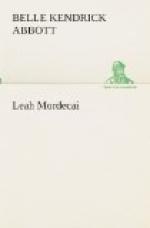Mr. Mordecai again occupied his palatial home, which had survived the wreck of bombardment, and, unlike hundreds of his unfortunate fellow-citizens, he was unimpoverished. Aside from the good fortune that had attended his financial arrangements in this country during the period of conflict, he had also a banking connection in England, that would alone have made him a rich man.
So back to his home Mr. Mordecai came, not in poverty and want, not in sackcloth and mourning for the slain, and yet not in joy or contentment. From the fearful day when he lost his beautiful daughter, his heart had been darkened and his hopes destroyed, and through the eventful years that had slipped on since he last beheld her face, a feeling of unrelenting bitterness had possessed his soul. Always angry with Leah and with the man who had led her into disobedience, he now felt still more bitter toward him, as he deemed him a felon, a murderer, unpunished and unforgiven. The change of place and scene, the rushing and hurrying of events during the years of refugee life, had tended somewhat to crowd from his mind the thoughts of his lost daughter; but now that he was back again, back in the old home, where every niche and corner, flower and shrub, were associated with her memory, the father was miserable indeed-miserable because he well knew that somewhere upon the broad earth, Leah, if living at all, was living in loneliness and dreariness, in poverty and sorrow.
CHAPTER XLII.
The first spring of peace gave place to summer, a summer memorable for its intense heat. One afternoon, toward the latter part of July, clouds dark and angry overcast the sky, and peals of thunder and flashes of lightning threatened a terrific storm. Pedestrians hurried homeward, and man and beast sought safety under shelter. The waters of the quiet harbor, tossed by rude winds, grew angry and rose in white-capped breakers, that broke against the wharves, piers, and fortresses, as far as the eye could see. Sea-gulls screamed and flew wildly about at this ominous appearance of the heavens, while the songsters of the woods, and the pigeons of the barn-yard, sought shelter from the approaching tempest. At night-fall the rain descended in torrents.
Safely sheltered in his comfortable home, Mr. Mordecai sat for an hour or more, watching, from his library window, the fury of the storm. The tall, graceful cedars and olive trees that adorned the front and side gardens of his home, were swaying in the wind which rudely snatched from their trellises the delicate jessamine and honeysuckle vines that lent such delicious odor to the evening winds. It tore the flowers from their stems, and the rain pelted them into the earth in its fury. Leaves were whisked from their branches, and blown out of sight in a twinkle. A weak-hinged window-shutter of the attic was ruthlessly torn away and pitched headlong into the street. All this Mr. Mordecai watched in amazement, and then, as if some sudden apparition of thought or of sight had appeared before him, he turned from the window with a shudder, and said:




